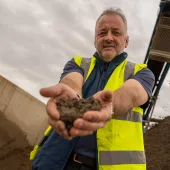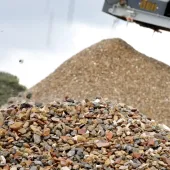GB landfill market continuing to contract

Volumes of waste disposed to landfill continue to fall as commitment to waste treatment strengthens
THE landfill market in Great Britain is continuing to contract. Latest workings from BDS Marketing Research covering the main municipal and other open-gate inert-only facilities suggest that final figures for 2016/2017 will see volumes disposed of to landfill fall further, towards the 20 million tonnes mark.
This is partly in response to strengthening government and waste authority commitments to treat, rather than dispose of, waste, but also a consequence of more waste-treatment capacity coming on line. In reality, the two factors are intertwined. In addition, there are more facilities entering and progressing through the planning and development pipeline.
A key factor in the reduction in landfilled tonnage is the municipal waste contracts market. Under a two-tier system introduced under the 1990 Environmental Protection Act, district councils were given the responsibility to collect municipal waste (Waste Collection Authorities – WCAs), while county councils were responsible for the disposal of that waste (Waste Disposal Authorities – WDAs). Unitary authorities have the role of both WCA and WDA.
At the turn of the century, the vast majority of the contracts let by WDAs were, as their name suggests, for the disposal of municipal waste. In most cases, this meant to landfill. At that time, there were a limited number of ‘incinerators’, burning rubbish to generate electricity.
This activity has been re-badged, with the technology now referred to as ‘energy-from-waste’ or EfW, and is now considered to be treatment, rather than disposal. At that time, WCAs focused almost entirely on their responsibility to collect municipal waste, leaving any downstream waste-treatment activity to the WDAs.
The introduction of the Landfill Tax, in October 1996, served as a warning to the waste industry that it must develop alternative solutions to provide for the reuse, recycling and treatment of municipal waste. The industry has grasped the opportunity with both hands, developing waste technologies with the acronyms such as MBT, MRF, IVC, AD, ELV, WEE, RDF and more.
When first introduced just over 20 years ago, Landfill Tax stood at £7 per tonne for the standard rate, which relates to ‘active’ waste. Inactive waste, such as builder’s rubble, attracted the lower rate of £2 per tonne. In the current tax year, the rates stand at £86.10 and £2.65 per tonne respectively.
The nature of the waste contracts let by WDAs and WCAs has changed significantly since the turn of the century. Whilst the underlying duties and core responsibilities remain, the activities carried out by each have developed apace. For many WDAs landfill represents, predominantly, the channel used only for waste that is unable to be treated by any other process.
Whilst there is still a sizable number of WDAs that have to dispose of municipal waste to landfill, in many cases their days are numbered as new large-scale facilities are currently in development, supported by long-term contracts (up to 40 years in length).
At WCA-level, residual and recyclate collection is ongoing but more than 50% of these authorities now let waste-treatment contracts directly with third party waste companies, instead of leaving this to the relevant WDA.
One of the main reasons behind this is that it can allow the WCA to generate an income-stream for itself in the sale and treatment of many of its recyclates. These contracts tend to be shorter in duration, maybe two or three years in many cases.
WDA contracts will be for many times that, to allow for waste companies that have developed major waste infrastructure, such as EfW or MBT plants, the opportunity to get a return on investment that may have run into hundreds of millions of pounds.
BDS have closely monitored the development of the waste industry since the early days when exhausted mineral extraction sites were turned into landfill. A core activity now is the tracking of the municipal waste contract market.
In the first quarter of each year, the consultancy publishes details of waste contracts let by all of the WCAs and WDAs in Great Britain. In the most recent annually updated reports, published in March 2017, details of more than 2,100 separate contracts are provided.
For further details, contact Andy Sales on tel (01761) 433035; or email: andy.sales@bdsmarketing.co.uk
BDS Marketing Research are a marketing consultancy who publish reports in the heavy building materials industry, including aggregates, ready-mixed concrete, asphalt, concrete products, cement and waste. They are also commissioned by individual companies to undertake marketing work such as market and customer research, new product development, due diligence and acquisition appraisals.









